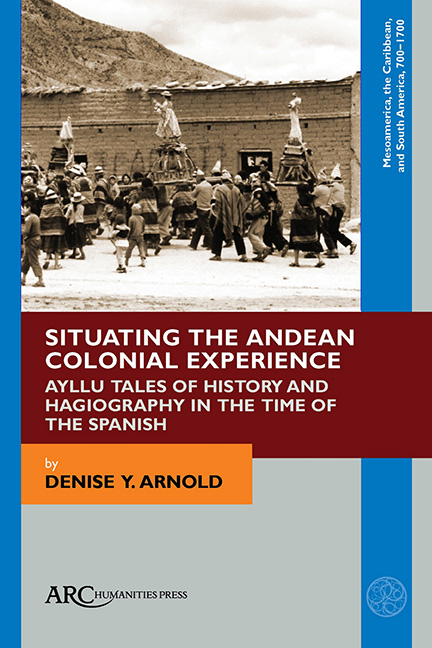 Situating the Andean Colonial Experience
Situating the Andean Colonial Experience Book contents
- Frontmatter
- Contents
- List of Illustrations
- Note About the Spelling of Toponyms and Proper Names
- Acknowledgements
- Maps
- Introduction
- PART ONE THE ORAL HISTORY OF QAQACHAKA
- PART TWO THE COLONIAL CACIQUES IN ORAL AND WRITTEN HISTORY
- PART THREE QAQACHAKA MARKA
- PART FOUR THE SAINTS APPEAR
- PART FIVE THE RELIGIOUS PRACTICES OF QAQACHAKA MARKA
- Some Conclusions
- Glossary
- Appendix A Document C of Don Franco Quispe Maraza
- Appendix B Document K of Don Franco Quispe Maraza
- Bibliography
- Thematic Index
- Index of Toponyms
- Frontmatter
- Contents
- List of Illustrations
- Note About the Spelling of Toponyms and Proper Names
- Acknowledgements
- Maps
- Introduction
- PART ONE THE ORAL HISTORY OF QAQACHAKA
- PART TWO THE COLONIAL CACIQUES IN ORAL AND WRITTEN HISTORY
- PART THREE QAQACHAKA MARKA
- PART FOUR THE SAINTS APPEAR
- PART FIVE THE RELIGIOUS PRACTICES OF QAQACHAKA MARKA
- Some Conclusions
- Glossary
- Appendix A Document C of Don Franco Quispe Maraza
- Appendix B Document K of Don Franco Quispe Maraza
- Bibliography
- Thematic Index
- Index of Toponyms
Summary
… the question is how to reconfigure people as theoretical agents instead of “passive subjects.”
Viveiros de Castro (2004, 4)IT HAS TAKEN me many years to complete just a part of the history of Qaqachaka, nowadays a major ayllu situated in Avaroa province (in the Department of Oruro, Bolivia) (see Maps 1 and 2), concentrating here on the colonial period. One excuse is that I had been waiting for several other studies on the history of the region, in a comparative sense. Apart from the seminal study on Qaraqara-Charka by Platt, Bouysse-Cassagne, and Harris, published in 2006, I wanted to consult the histories of Qaqachaka's neighbouring ayllus, among them the study on K’ulta by Tom Abercrombie (1986, 1998) and that on Tinguipaya by Vincent Nicolás (2015).
In addition, I was keenly aware of the need to dedicate time to rethink historiography and historical method from the perspective of Anthropology and Andean Studies, in the light of recent changes in these disciplines. In the 1980s, when we carried out our original fieldwork, the Black Legend in vogue, with its anti-Spanish bias, tended to skew any interpretation of the historical processes of the colonial period in overly dichotomic terms: “lo andino” versus anything Western, goodies (the Indians) versus baddies (the conquerors), and so on. However, my early examinations of local narratives already revealed a greater complexity in play.
The current paradigm shift in the Social Sciences, above all the “ontological turn” in Andean Studies with its recognition of a more dynamic and transformational world, offered me the opening I was waiting for. Alternative theories in the region, and emerging interpretations of the elements of the world, and the relations between them, contributed to my alternative approach to the history of the place (Arnold 2016a and Arnold 2016b). The challenge ahead was how to articulate my sense of déjà vu with these new ideas in the making.
Towards a Philosophy of Andean History
These recent paradigmatic changes in the Social Sciences and the Humanities make us aware that notions such as “history” and “memory” are neither singular nor monolithic. In the Andes, given its colonial setting, the practices of history and memory are even more complex, having been forged first in the interrelations between Andean populations themselves (Aymara, Quechua, and Uru speakers), and since the Conquest, in relation to Spanish society.
- Type
- Chapter
- Information
- Situating the Andean Colonial ExperienceAyllu Tales of History and Hagiography in the Time of the Spanish, pp. 1 - 26Publisher: Amsterdam University PressPrint publication year: 2021


